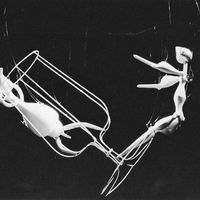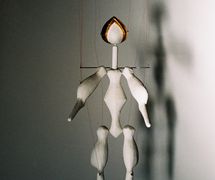Slovenian director, musician and teacher. Edi Majaron studied at the Academy of Music in Ljubljana, and later at AMU (Akademie múzických umění, Academy of Performing Arts) in Prague (see DAMU – Divadelní fakulta akademie múzických umění). There he also studied puppetry and began a career as a cellist. He built his first puppet theatre in 1954 and participated in productions of director Jože Pengov at the Lutkovo gledališče Ljubljana (Ljubljana Puppet Theatre) in Ljubljana (1955-1964).
Between 1979 and 1984, Edi Majaron was artistic director of the Ljubljana Puppet Theatre, and in 1991 he founded a new puppet company, Freyer Teater, where he is its director and artistic manager. He has directed over ninety shows in Slovenia, Croatia, Serbia, Bosnia and Herzegovina, Poland, Italy and Belarus.
Among the productions he directed in Ljubljana are Lizistrata (Lysistrata, 1987) by Aristophanes; Trnuljčica (The Sleeping Beauty, 1992) of Tchaikovsky; Osel nazarenski (The Donkey of Nazareth, 1996) by Robert Waltl; Hišica iz kock (House of Cubes, 2003); and Velika skupnjava sv. Antona (The Great Temptation of St Anthony, 2008) by Michel de Ghelderode. In Mostar his productions included Martin Krpan (1976); Zlatorog (The Golden Horn, 1986); and Priča o Mariji (The Story about Mary, 1994). In Sarajevo he directed Ptice (The Birds, 1980) of Aristophanes. In Rijeka he was responsible for Pinocchio (1993) after Carlo Collodi; Slike s izložbe (Pictures at an Exhibition, 1998) after Nikolai Gogol and Modest Mussorgsky; Sve o Žaklinama (All about Jacquelines, 2004) by Magdalena Lupi after a tale of Eugène Ionesco; and Mala vještica (The Little Witch, 2005) by Otfried Preussler and Magdalena Lupi. In Zadar he directed Ribar Palunko i njegova žena (Palunko the Fisherman and His Wife, 1989) and in Zagreb Ogovaranja (Gossiping, 1987), after Theophrastus. His work in Belgrade included Bura (1989) based on William Shakespeare’s The Tempest. In Bari, Italy, he directed San Nicola e i Bambini (Saint Nicolas and the Little Children) and La Cecchina (1998) by Niccolò Piccinni. In Minsk he staged Proisšestvije u gorodu Goga (The Event in the Town Goga, 1987) based on the play by Slovene playwright Slavko Grum.
Many of these productions have also been presented at festivals in Charleville-Mézières and elsewhere in Europe, the United States, Iran, South Korea and Japan. Common to all is the combining of several types of puppets and live musical accompaniment.
Edi Majaron received one of Slovenia’s major cultural awards, the Prešeren Prize in 1988 (named after the famous 19th century Slovene poet, France Prešeren), as well as several international awards recognizing his professional contributions to theatre and puppetry in particular. From 1983 until 2004, he was the organizer of the Lutke festival in Ljubljana. His international work is closely allied to UNIMA. He has served on its Executive Committee (1980-2000) and as a member of its Professional Training Commission, Research Commission, and Puppetry in Education Commission. In 2008, he was recognized as a UNIMA Member of Honour.
In 1991, Edi Majaron began teaching at the University of Ljubljana (Faculty of Education). In 2004, he prepared the programme of the puppetry studies and contributed toward the establishment of a puppet and theatre department at the Art Academy in Osijek, Croatia, where he lectured until 2010 on subjects relating to puppet animation. He participated in the Academy of Sciences, on the Commission of theatrical terminology.
He has also supported the application of puppetry in general education. He has held workshops on “Puppets in the Curriculum” for schoolteachers in Slovenia, Croatia and Italy, and has lectured at the universities in Bari (Italy), Oulu (Finland) and Graz (Austria).
Finally, Edi Majaron has composed music for theatre and authored articles on puppetry. For Television Slovenia he recorded puppet and music serials including Chamber Music through the Centuries, Pictures & Music, In Sign of Twins, A Handspan of Fairy Tales, and Fairy Tale about Tsar Saltan. His articles on puppet dramaturgy and direction, as well as puppet history, include The Absolute Puppeteer Jože Pengov (2004). His essays on puppetry in education appeared in The Puppet – What a Miracle! (2002) and The Power of the Puppet (2012), both published by UNIMA.
(See Slovenia.)











